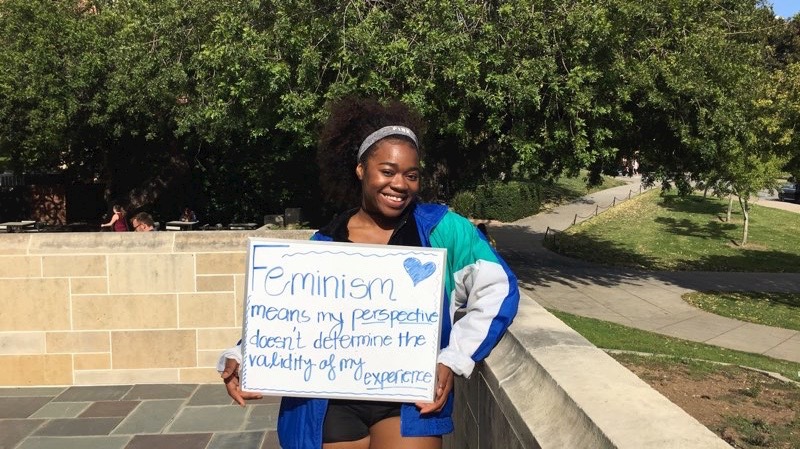Featured UCLA Feminist: NJ Omorogieva

Photo by Natalie Delpino
NJ Omorogieva is a second-year student double-majoring in psychology and sociology and minoring in education. She is also a passionate intersectional feminist. Omorogieva is always prepared to stand up for herself and for others, and views feminisms as the strength “to stand up against the [any]-ism that perpetuates injustice…that perpetuates a system that isn’t meant for equality.”
Omorogieva’s belief in intersectionality began in her sophomore year of high school, after her Advanced Placement United States history class spent two months discussing feminism. As the only person of color in the class, Omorogieva wondered if she was the only who noticed that they had spent those two months only talking about white feminists, with the exception of the one day in which they talked about Harriet Tubman and Rosa Parks. Omorogieva explains: “Realizing that classes and teachers fail to see intersectionality as a valid form of feminism helped me realize it was my job to educate myself on those issues and to preach those to people who are misinformed or are too ignorant to realize that there is more than white feminism out there.” Since then, Omorogieva has searched for the voices forgotten in history and has fought to provide spaces for vulnerable communities.
As the new president of the Bruin Democrats, Omorogieva is eager to create a more intersectional club. She argues that the issues the club discusses pertain to numerous groups on campus who should be engaged in the conversation, but don’t feel welcomed by the club. She states “Undocumented students, female students, black female students…their voices need to be heard. But they don’t feel this [Bruin Democrats] is a place for them.” As the new president, she hopes to turn the Bruin Democrats into a space for those students.
Omorogieva is also the director for the 2018 production of LIPS. After acting in the 2017 production, Omorogieva decided she wanted to help with a production because it provides people with a platform and acceptance. “What LIPS meant to me was what LIPS should mean to everyone. It should mean that women and those who participated in the play go through so much turmoil that no one recognizes, that no one gives even a second thought …and you wouldn’t know unless you sat down and listen[ed].”
Her desire to uncover unheard voices has also lead her to study womanism, a specific form of feminism that focuses on the experiences of black women. Omorogieva started studying womanism about a year ago and quickly resonated with the movement, composed of African-American women who had been disregarded by the white feminist movement. Omorogieva argues that while it focuses on the experiences on African-American women, “these are women who started a trend that extends to so many different races, different, ethnicities, different groups of people.” It’s an opposition to white feminism, which Omorogieva believes is important for the future of feminism.
Omorogieva feels that there are reasons to be hopeful about the future. She argues that it’s impossible to recognize white feminism as an issue unless there is a term for it, and the fact we do have a term shows there is potential for growth and improvement. The use of “womyn” and “womxn” also makes her optimistic, feeling that providing terms to include all women in the movement (not just cisgender women) is a sign of improvement. “I see [feminism] becoming a lot more colorful. I see intersectionality becoming a norm,” said Omorogieva, and as a student, she feels like she’s already seeing so many amazing changes, she can’t help but feel optimistic.




